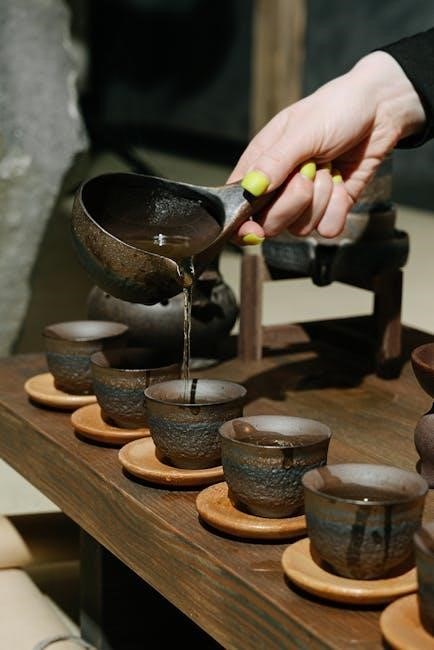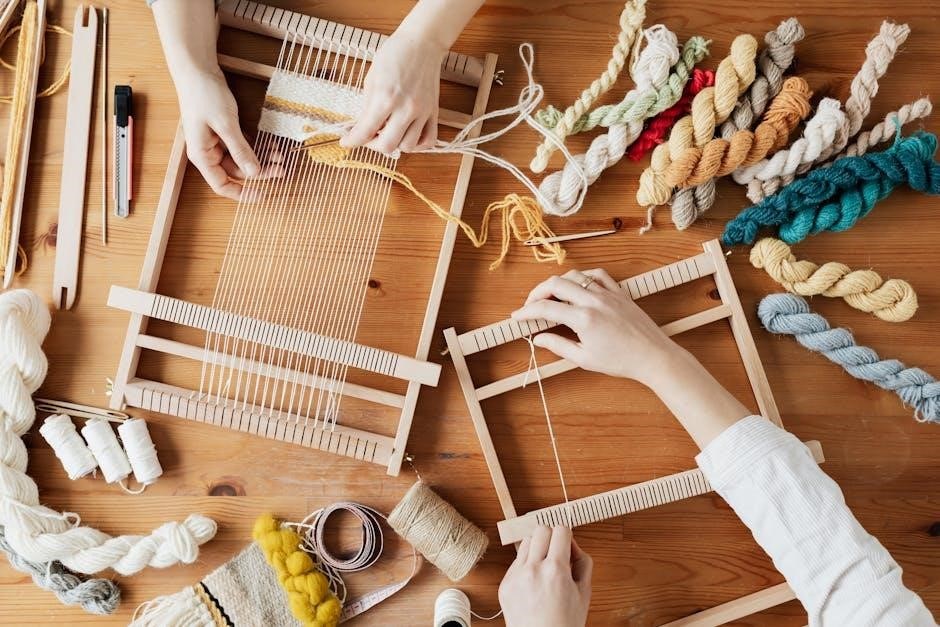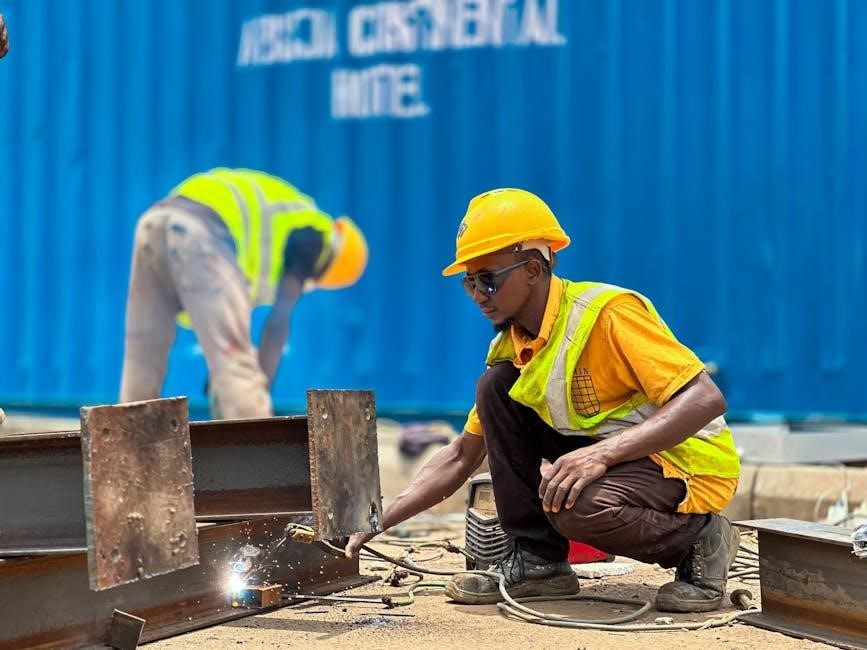Manual manhood is a concept emphasizing leadership, responsibility, and resilience, guiding men to embrace their roles with confidence and integrity in modern society.
1.1 Defining Manual Manhood
Manual manhood is a concept rooted in traditional values, emphasizing leadership, responsibility, and resilience. It encourages men to embrace their roles with integrity, fostering confidence and self-reliance. This ideology promotes emotional intelligence, physical health, and a strong moral compass. Manual manhood is not about dominance but about cultivating character and contributing positively to society. It thrives on mentorship, skill-building, and community, guiding men to navigate modern challenges with adaptability and courage. By focusing on personal growth and accountability, manual manhood offers a timeless framework for men to define and achieve their potential.
1.2 The Importance of Manual Manhood in Modern Society
Manual manhood plays a vital role in modern society by fostering resilience, accountability, and emotional intelligence. It counters toxic masculinity by promoting healthy expressions of strength and vulnerability. In a world grappling with shifting gender roles, manual manhood provides a framework for men to lead with integrity and empathy. By emphasizing responsibility and self-reliance, it equips individuals to navigate societal challenges effectively. This mindset encourages men to contribute positively to their communities, fostering stronger relationships and personal growth. Manual manhood is not just a relic of the past; it’s a timeless guide for men to thrive in today’s complex world with purpose and clarity.

The Evolution of Masculinity
Masculinity has evolved from traditional traits like strength and stoicism to embracing emotional expression and vulnerability, reflecting societal changes and redefined gender roles over time.
2;1 Historical Perspectives on Masculinity
Historically, masculinity was often defined by traits like strength, stoicism, and assertiveness, with societal expectations shaping men’s roles in families and communities. Across different cultures and eras, masculinity evolved, reflecting the values of the time. In ancient societies, masculine ideals often centered on warriors and leaders, while in more recent centuries, industrialization and urbanization reshaped these roles. Traditional masculinity emphasized providing, protecting, and leading, often discouraging emotional expression. These historical perspectives have influenced modern interpretations of manhood, creating a foundation for the concept of manual manhood, which blends timeless virtues with contemporary understandings of masculinity.
2.2 How Societal Expectations of Men Have Changed Over Time
Societal expectations of men have shifted significantly over time, moving from rigid, traditional roles to more fluid and inclusive definitions. Historically, men were often expected to embody strength, stoicism, and assertiveness, with a focus on providing and protecting. Industrialization and urbanization brought new challenges, reshaping these roles. In the 21st century, there is a growing emphasis on emotional expression, vulnerability, and shared responsibilities. Modern society encourages men to embrace a broader spectrum of traits, blending traditional virtues with contemporary values like empathy and collaboration, reflecting a more nuanced understanding of masculinity and its evolving role in society.
Key Characteristics of Manual Manhood
Manual manhood encompasses leadership, resilience, and responsibility, fostering emotional intelligence, discipline, and self-reliance. It emphasizes growth through challenges, balancing strength with vulnerability and integrity.
3.1 Leadership and Responsibility
Leadership and responsibility are cornerstone traits of manual manhood, emphasizing the importance of guiding others with integrity and accountability. A man embracing these qualities takes charge of his actions, decisions, and their consequences, fostering trust and respect. Leadership isn’t about dominance but empowering others, while responsibility ensures reliability and commitment. These traits are cultivated through mentorship, self-discipline, and a willingness to serve. By embracing leadership and responsibility, men become pillars of their communities, setting examples for others to follow and inspiring positive change in the world around them.
3.2 Emotional Intelligence and Vulnerability
Emotional intelligence and vulnerability are essential components of manual manhood, fostering deeper connections and personal growth. Emotional intelligence involves understanding and managing one’s emotions, as well as empathizing with others, which strengthens relationships and decision-making. Vulnerability, often misunderstood, is about openness and honesty, allowing men to express feelings without fear of judgment. These traits challenge traditional notions of masculinity, promoting a healthier, more balanced expression of manhood. By embracing emotional intelligence and vulnerability, men can build trust, communicate effectively, and cultivate meaningful bonds, ultimately becoming more well-rounded and resilient individuals.
3.3 Physical and Mental Resilience
Physical and mental resilience are cornerstone traits of manual manhood, enabling men to navigate life’s challenges with strength and determination. Physical resilience involves maintaining a healthy body through exercise and nutrition, ensuring endurance and stamina. Mental resilience, on the other hand, is about cultivating a strong mindset to cope with stress, setbacks, and adversity. Together, these qualities empower men to persevere, adapt, and overcome obstacles. Resilience is not just about enduring hardship but thriving through it, embodying the essence of manual manhood by fostering self-reliance and unwavering resolve in the face of adversity.

The Role of Mentorship in Developing Manhood
Mentorship is a guiding force that helps men develop character and leadership through experienced role models, fostering resilience and integrity for personal and societal impact.
4.1 The Importance of Male Role Models
Male role models play a crucial role in shaping a man’s identity and values, offering guidance and inspiration. They provide practical wisdom, emotional support, and real-life examples of resilience and integrity. Positive role models help men navigate life’s challenges, fostering confidence and accountability. Their influence is vital for developing leadership skills and a strong moral compass. By embodying strength, empathy, and responsibility, male role models create a lasting impact, helping men grow into capable, compassionate, and principled individuals who contribute positively to their communities and society at large.
4.2 How Mentorship Shapes Character and Decision-Making
Mentorship profoundly influences a man’s character by providing guidance, wisdom, and real-world examples of integrity and accountability. Through mentorship, men learn to navigate life’s complexities, developing resilience and confidence. Mentors offer valuable insights, helping shape decision-making skills by encouraging thoughtful consideration of values and consequences. This relationship fosters emotional intelligence, moral clarity, and a sense of purpose. Effective mentorship equips men to embrace leadership, take responsibility, and make choices that align with their principles. By learning from others’ experiences, men gain the tools to grow into capable, ethical, and compassionate individuals who lead with integrity and contribute meaningfully to their communities.
Practical Skills for Manual Manhood
Practical skills are essential for manual manhood, empowering men to handle life’s challenges with confidence and self-reliance, fostering independence and resilience in daily life.
5.1 Essential Life Skills Every Man Should Master
Mastering essential life skills is fundamental to manual manhood, fostering independence and confidence. These skills include critical thinking, problem-solving, and effective communication, which are vital for decision-making and relationships. Time management, financial literacy, and basic handyman skills also empower men to handle daily challenges with ease. Additionally, cooking, emotional intelligence, and adaptability are crucial for self-reliance and personal growth. These skills not only enhance individual capability but also contribute to building strong, resilient communities, ensuring men can thrive in various aspects of life while maintaining integrity and accountability.
5.2 The Value of Handiness and DIY Skills
Handiness and DIY skills are cornerstone traits of manual manhood, fostering self-reliance and problem-solving abilities. These skills empower men to tackle tasks independently, from carpentry to mechanics, promoting confidence and resourcefulness. DIY projects encourage critical thinking and creativity, while also saving time and money. Beyond practical benefits, these skills cultivate a sense of accomplishment and pride in one’s work. They also pass down valuable knowledge to future generations, contributing to personal growth and community resilience. Mastering DIY skills is not just about fixing things—it’s about embracing a mindset of empowerment and responsibility, essential for thriving in life’s challenges.
5;3 Financial Literacy and Independence
Financial literacy is a foundational aspect of manual manhood, enabling men to manage resources effectively and achieve long-term stability. Understanding budgeting, saving, and investing empowers individuals to make informed decisions, reducing debt and building wealth. Financial independence fosters personal freedom, allowing men to pursue goals without undue financial strain. It also promotes responsibility and accountability, ensuring security for oneself and others. Mastery of financial skills is not just about money—it’s about dignity, self-reliance, and the ability to contribute meaningfully to family and community. Financial literacy is a cornerstone of manual manhood, equipping men to navigate life’s challenges with confidence and prudence.

Overcoming Challenges and Building Resilience
Manual manhood involves embracing adversity as a catalyst for growth, fostering resilience through perseverance and problem-solving. It teaches men to face challenges head-on, emerging stronger and wiser.
6.1 Facing Adversity with Courage
Facing adversity with courage is a cornerstone of manual manhood, requiring men to stand firmly against challenges without fear. Courage is not the absence of fear but the willingness to act despite it. It involves making tough decisions, taking responsibility, and remaining steadfast in the face of uncertainty. By embracing adversity, men build resilience, develop character, and foster a sense of purpose. Courageous action inspires others and strengthens communities, proving that true manhood is measured by how one navigates life’s storms with integrity and determination.
6.2 Learning from Failure and Persistence
Learning from failure and persistence is essential to manual manhood, as it fosters growth and resilience. Failure is not defeat but a stepping stone to success, teaching men valuable lessons about perseverance and adaptability. Persistence, paired with self-reflection, helps men identify weaknesses and improve. Embracing failure as a teacher builds character and strengthens determination. It encourages men to take risks, confront challenges head-on, and rise stronger after setbacks. Persistence, in turn, cultivates discipline and focus, enabling men to achieve their goals and inspire others. Through failure and persistence, men develop the grit needed to overcome adversity and lead with integrity.
The Importance of Community and Brotherhood
Community and brotherhood foster mutual support, shared growth, and collective strength, enabling men to thrive personally and contribute positively to society through unity and camaraderie.
7.1 Building Strong Relationships with Other Men
Building strong relationships with other men fosters trust, accountability, and mutual growth. These bonds, rooted in shared values and experiences, encourage collaboration and emotional connections. Men learn to communicate openly, support each other through challenges, and celebrate successes together. Brotherhood creates a sense of belonging, reducing isolation and promoting collective resilience. Healthy relationships with other men also model positive behaviors, inspire personal development, and strengthen communities. By investing in these connections, men build a network that enriches their lives and empowers them to thrive individually and collectively.
7.2 The Role of Friendships in Personal Growth
Friendships play a vital role in personal growth for men, fostering trust, support, and accountability. Meaningful relationships with friends encourage emotional expression, helping men develop emotional intelligence and resilience. Through shared experiences and challenges, friendships provide opportunities for self-reflection and growth. Friends often serve as mirrors, offering honest feedback that promotes self-awareness and improvement. These bonds also create a sense of belonging, reducing feelings of isolation and empowering men to pursue their goals with confidence. Strong friendships cultivate empathy, humility, and a deeper understanding of oneself, which are essential for embracing manual manhood and living a fulfilling life.

Modern Interpretations of Manhood
Modern interpretations of manhood emphasize emotional expression, vulnerability, and adaptability, moving beyond traditional stereotypes to embrace a more inclusive and evolving definition of masculinity.
8.1 Redefining Masculinity in the 21st Century
Redefining masculinity today involves embracing emotional expression, vulnerability, and adaptability, moving away from rigid stereotypes. Modern manhood prioritizes empathy, collaboration, and inclusivity, rejecting toxic traits like aggression and dominance. Men are encouraged to explore diverse roles, challenging traditional norms. This shift reflects societal changes, including evolving gender roles and diverse family structures. By redefining masculinity, men can embrace authenticity and resilience, fostering healthier relationships and personal growth. This evolution aligns with the principles of manual manhood, emphasizing self-improvement and integrity in a rapidly changing world;
8.2 Breaking Free from Toxic Masculinity
Breaking free from toxic masculinity involves rejecting harmful stereotypes like aggression and emotional suppression. It encourages men to embrace vulnerability, empathy, and open communication. This shift fosters healthier relationships and personal growth. Recognizing the damage caused by rigid gender roles, modern manhood promotes self-awareness and emotional intelligence. By challenging societal expectations, men can redefine strength as resilience, compassion, and authenticity. This transformation supports mental health and fosters a more inclusive, balanced understanding of masculinity, aligning with the principles of manual manhood and its emphasis on integrity and self-improvement.
The Intersection of Manhood and Emotional Health
Manual manhood emphasizes the importance of mental health, encouraging men to embrace vulnerability and emotional expression. It promotes self-awareness, resilience, and open communication to foster well-being.
9.1 The Importance of Mental Health for Men
Manual manhood underscores the critical role of mental health in men’s lives, encouraging open dialogue and self-care. Societal expectations often discourage emotional expression, leading to isolation and stress. Prioritizing mental well-being fosters resilience, clarity, and stronger relationships. By addressing stigma and promoting vulnerability, men can embrace a healthier, more balanced lifestyle. Emotional strength is as vital as physical endurance, ensuring men can navigate life’s challenges with confidence and authenticity. Recognizing mental health as a cornerstone of manhood empowers individuals to seek support, fostering personal growth and overall well-being.
9.2 Normalizing Vulnerability and Emotional Expression
Manual manhood encourages men to embrace vulnerability as a strength, not a weakness; Traditional societal norms often discourage emotional expression, perpetuating harmful stereotypes. By normalizing vulnerability, men can foster deeper connections and emotional resilience. Openly expressing feelings without fear of judgment creates authenticity and trust in relationships. Vulnerability also promotes mental health by reducing stress and anxiety. Encouraging men to share their emotions openly helps break down toxic masculinity, fostering a culture of empathy and understanding. Emotional expression is a cornerstone of balanced manhood, leading to stronger, more meaningful relationships and personal growth.

Manual Manhood and Personal Development
Manual manhood aligns with personal growth by fostering self-awareness, discipline, and intentional living. It encourages men to pursue self-improvement, setting meaningful goals and cultivating habits that refine their character and purpose, leading to a fulfilling life.
10.1 Setting Goals and Achieving Self-Improvement
Setting clear, actionable goals is essential for personal growth in manual manhood. It involves defining a vision, breaking it into manageable steps, and maintaining discipline to achieve them. Goal-setting fosters resilience, adaptability, and accountability, aligning actions with core values. Regular self-assessment helps track progress, celebrate successes, and learn from setbacks. This process cultivates a mindset of continuous improvement, enabling men to refine their character, build confidence, and pursue meaningful purposes. Through consistent effort, they develop the habits and determination needed to overcome challenges and grow into capable, purpose-driven individuals.
10.2 Cultivating Discipline and Self-Control
Cultivating discipline and self-control is a cornerstone of manual manhood, enabling men to navigate life’s challenges with focus and integrity. Discipline builds habits that foster accountability, while self-control empowers individuals to make decisions aligned with their values. By prioritizing mindfulness and consistent effort, men can master their impulses, leading to greater emotional stability and personal growth. This foundation of self-regulation allows for clearer goal achievement, stronger relationships, and a deeper sense of purpose. Through discipline, men embody resilience, reliability, and character, becoming pillars of strength in their communities and role models for others.
The Role of Physical Fitness in Manhood
Physical fitness is vital for men, fostering strength, endurance, and mental resilience. It builds character, enables overcoming challenges, and embodies the essence of manual manhood.
11.1 The Importance of Physical Health for Men
Physical health is a cornerstone of manual manhood, fostering mental clarity, discipline, and longevity. It builds resilience, enhances hormone balance, and strengthens the body’s ability to endure challenges. Regular exercise improves cardiovascular health, reduces chronic disease risks, and boosts energy levels. A strong physique also symbolizes discipline and responsibility, key traits of manual manhood. By prioritizing fitness, men set a positive example for others, embodying leadership and commitment to self-improvement. Physical health is not just a personal goal but a foundation for living a purposeful, resilient, and impactful life.
11.2 Building Strength and Endurance
Building strength and endurance is vital for manual manhood, as it cultivates resilience and the ability to overcome physical and mental challenges. Strength training enhances muscle mass and bone density, while endurance boosts cardiovascular health and stamina. These qualities are not just for physical tasks but also translate into mental fortitude, enabling men to persevere through adversity. Consistent effort in building strength and endurance fosters discipline, a key attribute of manual manhood. It prepares men to handle life’s demands with confidence, embodying the principles of resilience and self-reliance that define true manhood.

Manual Manhood and Relationships
Manual manhood fosters strong, respectful connections, emphasizing effective communication, emotional support, and mutual understanding. These qualities build trust and promote healthy, enduring relationships.
12.1 Building Healthy Romantic Relationships
Building healthy romantic relationships is rooted in mutual respect, trust, and open communication. Manual manhood emphasizes emotional intelligence, allowing men to connect deeply with their partners. Vulnerability and empathy foster intimacy, while accountability ensures commitment. Healthy relationships thrive when both partners feel valued and heard. Effective communication involves active listening and expressing emotions clearly. Conflict resolution is approached calmly and respectfully, prioritizing understanding over winning. Shared goals and teamwork strengthen the bond, creating a partnership based on equality and support. By embracing these principles, men can cultivate fulfilling, lasting relationships that enrich their lives and those of their loved ones.
12.2 Communicating Effectively with Partners
Effective communication is the cornerstone of thriving romantic relationships. Manual manhood encourages men to practice active listening, ensuring their partners feel heard and understood. Clarity and honesty in expressing thoughts and feelings foster trust and intimacy. Empathy and emotional intelligence help navigate conflicts constructively, prioritizing understanding over winning arguments. Non-verbal cues, such as body language and tone, also play a vital role in conveying respect and affection. By embracing open, respectful dialogue, men can build stronger connections, resolve disagreements amicably, and create a safe, supportive environment for their partners to grow and thrive together.
The Impact of Manual Manhood on Society
Manual manhood fosters positive societal change through community engagement, mentorship, and responsible leadership, encouraging men to contribute meaningfully to social progress and collective well-being.
13.1 How Manual Manhood Contributes to Community Building
Manual manhood fosters community building by encouraging men to engage in collaborative efforts, shared responsibilities, and collective goal-setting. By promoting teamwork, mutual respect, and active participation, it strengthens social bonds and creates supportive environments. Men embracing manual manhood often take initiative in local projects, volunteer work, and neighborhood initiatives, inspiring others to contribute. This mindset reduces social divisions and promotes unity, ensuring communities thrive through shared efforts and a sense of purpose. The emphasis on collaboration and accountability cultivates a culture of trust and cooperation, making communities more resilient and cohesive.
13.2 The Role of Men in Leadership and Social Change
Men embracing manual manhood play a pivotal role in leadership and social change by modeling integrity, vision, and accountability. They inspire others through their commitment to justice and equality, often taking initiative in addressing societal challenges. By leading with empathy and courage, they foster environments where diverse voices are heard and valued. Their influence extends beyond individual actions, driving collective efforts to dismantle systemic inequities and promote progress. Through their leadership, men contribute to a more inclusive and compassionate society, demonstrating that true strength lies in empowering others and championing positive transformation.
Manual manhood emphasizes leadership, resilience, and integrity, guiding men to foster positive change and personal growth. Embrace these principles to build a stronger, compassionate society.
14.1 Summarizing the Key Principles of Manual Manhood
Manual manhood combines traditional values like leadership, responsibility, and resilience with modern ideals of emotional intelligence and vulnerability. It emphasizes the importance of mentorship, practical skills, and financial literacy, fostering independence and self-reliance. By embracing these principles, men can build strong relationships, contribute to their communities, and champion positive change. Manual manhood encourages personal growth, discipline, and integrity, empowering individuals to navigate life’s challenges with confidence and purpose. These principles guide men to become well-rounded, compassionate, and impactful leaders in both personal and societal contexts.
14.2 Encouragement to Embrace and Practice Manual Manhood
Embracing manual manhood is a powerful journey toward self-improvement and societal impact. By cultivating leadership, resilience, and emotional intelligence, men can become pillars of strength in their communities. Practicing these principles fosters meaningful relationships, personal growth, and a sense of purpose. It’s about embracing vulnerability, taking responsibility, and striving to be better versions of oneself. Manual manhood is not just a set of ideals but a way of life that empowers men to lead with integrity, contribute positively, and inspire others. Every man has the potential to embody these principles and create a lasting, positive impact.
